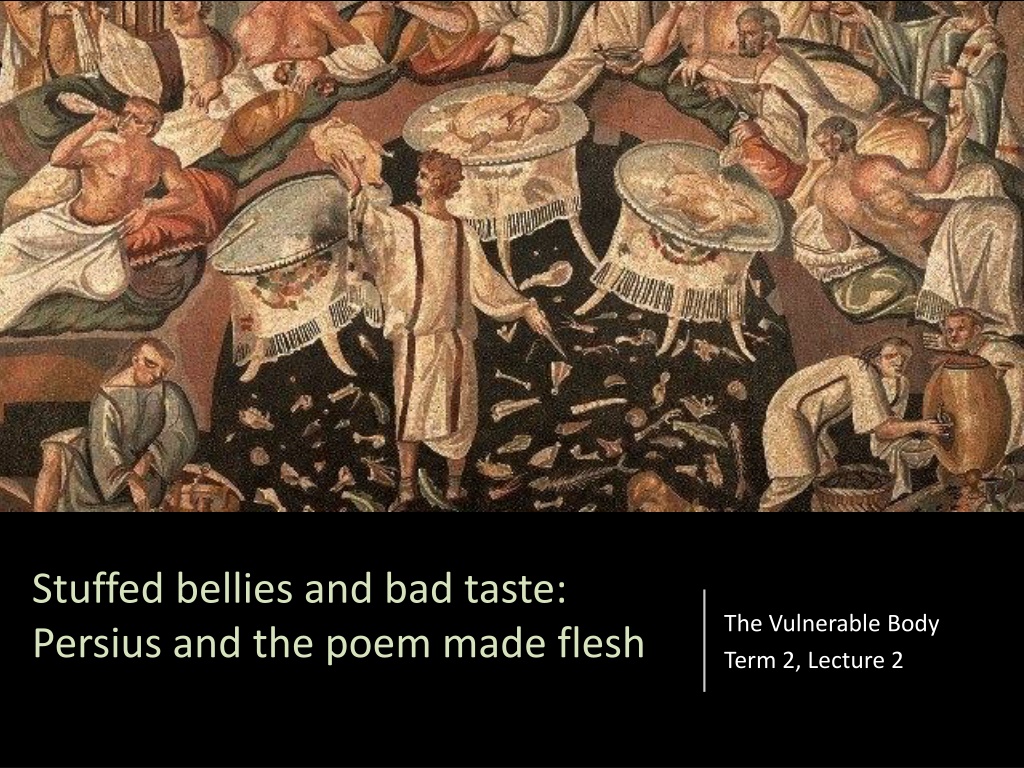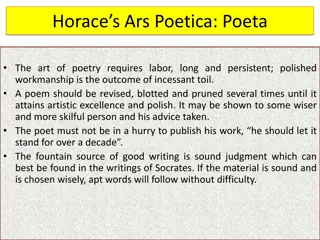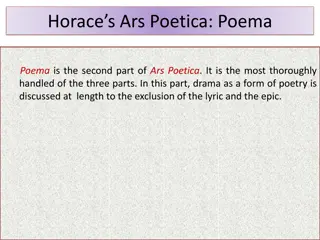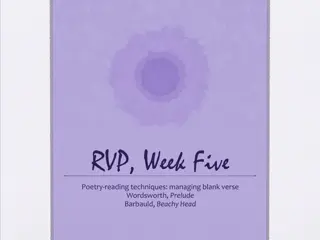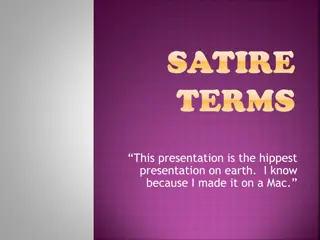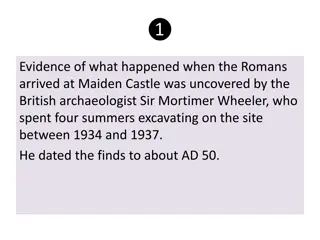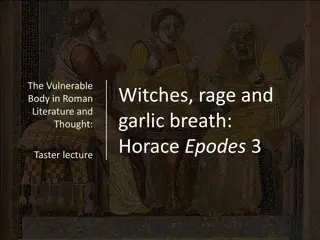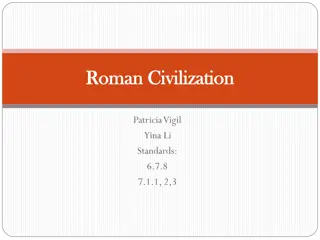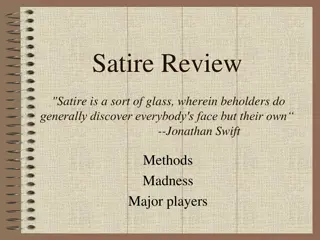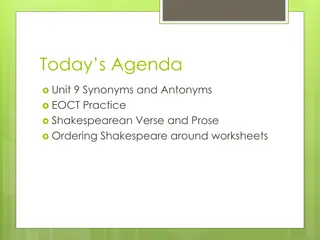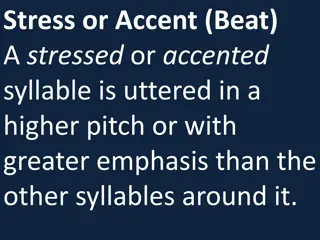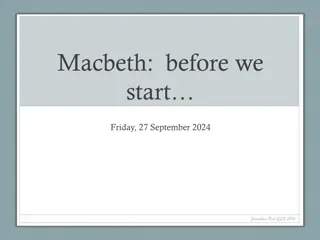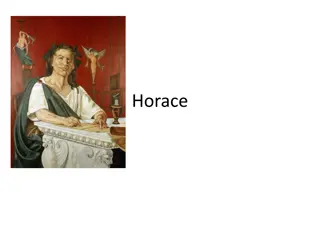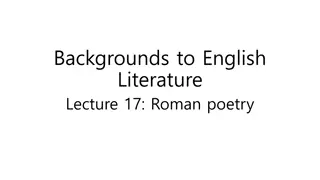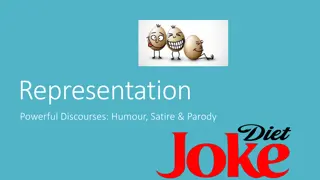Exploring Roman Verse Satire Through Bodies: Horace and Persius
Delve into the representation and treatment of bodies in Roman verse satire through the works of Horace and Persius. Analyze how these poets intertwine physical vulnerabilities, personal histories, and societal critique within their satirical compositions. Discover the power of vulnerability in satire and the intricate connections between the poets' fictional bodies and the subjects they satirize.
Download Presentation

Please find below an Image/Link to download the presentation.
The content on the website is provided AS IS for your information and personal use only. It may not be sold, licensed, or shared on other websites without obtaining consent from the author. Download presentation by click this link. If you encounter any issues during the download, it is possible that the publisher has removed the file from their server.
E N D
Presentation Transcript
Stuffed bellies and bad taste: Persius and the poem made flesh The Vulnerable Body Term 2, Lecture 2
Revision question How does Roman verse satire (or, so far, Horace) represent and deal with BODIES? Key Latin words: satura satur - satis
Horaces Satires key revision points Horace s lowly conversations (sermones) are bound up with the physical body of the poet himself, with its marks , weaknesses, family DNA, and with the bodies he associates with or desires E.g. Recall how he rewrites the genealogy of satire as his own family traditions in Sat.1.4, and defines his moral and poetic moderation , as well as social status as son of a freedman, by the types of women he sleeps with in Sat.1.2
Often, the poets fictional body is just as vulnerable and messy as the bodies he vilifies. For example: speaking as the wooden Priapus statue in Sat.1.8, the poet succeeds in policing the new political landscape (in the form of Maecenas villa), but by bending over backwards and farting at the witches, causing his fig-wood bottom to split open.
Vulnerability in writing/reading Does it take one to know one? Are satirists/comedians who undermine themselves especially powerful, convincing, or appealing?
Persius prologue: the scazon Note the limp (dragging long syllables) at the end of the line: Nec fonte labra prolui caballino u / u / u / u / u Cf. Catullus 8: miser Catulle, desinas ineptire
It all boils down to . decoctius = something more boiled down (Sat.1.125) Concentrate? Potion? Medicine? Strong-tasting and pungent? A new (Stoic) take on the aesthetic of brevitas, or brevity?
Persius is hard to read. He wants it that way . (A.Cucchiarelli, The Cambridge Companion to Roman Satire)
Persius the Stoic satirist A return to Zeno s Stoic principles concise, unfrilly rhetoric? But ironic distance from Stoic doctrine?
Persius: the central paradox The message of the Satires is that we should harden up, live properly (recte vivere), stop being soft (mollitia is a key word). Yet our textbook immerses us in a poetic world that is grotesque and over-rich, that is all about bending boundaries, contagion, odd juxtaposition
So do the Satires give us indigestion, rather than offering us a detox diet?
Gowers (1993) 124, 185: The muse of satire was none other than the bloated bodies, protuberant guts, and messy stews that are the chief objects of the satirist s abuse .The fat stomachs, distended with tripe, that fill Persius pages not only embody moral laxity and crass sensibilities; they are also walking figures of the text itself. Bartsch (2015) 62-3: We can mount a better defense of our satirist than this . What Persius threatens to do is to cook the mass in his pot some more, to concoct it into something that can be digested and will distribute nourishment properly to those who read it. We recall that one of Seneca s injunctions on reading/digestion was that too many foodstuffs not be sampled at once, precisely because this would interfere with digestion Persius Satires both raise this problem and promise to resolve it: they will render those rich dishes into something more simple.
The prologue That s not how I suddenly become a poet, By wetting my lips in the Hippocrene, Or dreaming on the twin peaks of Parnassus. I leave the Muses, and Pirene s pale Spring, to those with busts to which A crown of ivy clings; a semi-pagan bring my song to the bards holy rites. What teaches the parrot to squawk: Hello! And urges the magpie to try human speech? It s that master of arts, and dispenser of skills, Hunger, expert at trying out sounds nature denies. For if there s the gleam of a hope of crafty gain, You ll hear crow-poets and magpie-poetesses Singing in praise of Pegaseian nectar.
